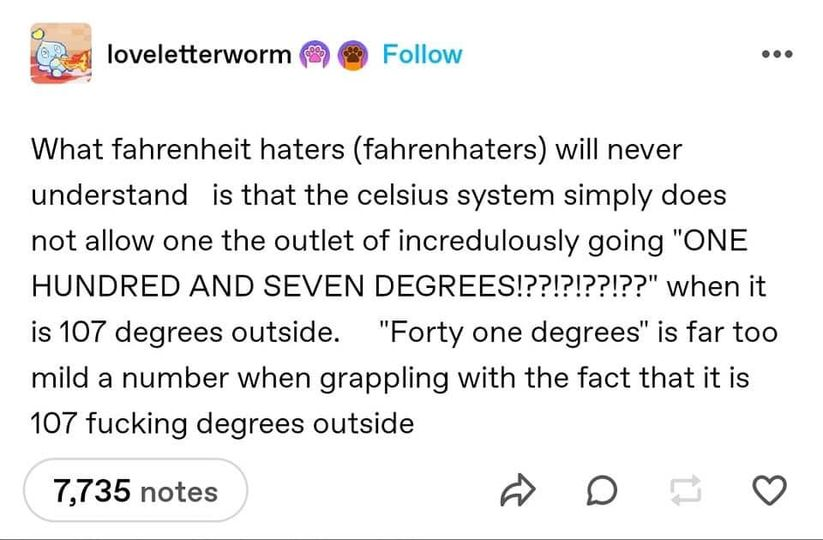this post was submitted on 09 Sep 2024
1236 points (92.3% liked)
Science Memes
10950 readers
2052 users here now
Welcome to c/science_memes @ Mander.xyz!
A place for majestic STEMLORD peacocking, as well as memes about the realities of working in a lab.

Rules
- Don't throw mud. Behave like an intellectual and remember the human.
- Keep it rooted (on topic).
- No spam.
- Infographics welcome, get schooled.
This is a science community. We use the Dawkins definition of meme.
Research Committee
Other Mander Communities
Science and Research
Biology and Life Sciences
- !abiogenesis@mander.xyz
- !animal-behavior@mander.xyz
- !anthropology@mander.xyz
- !arachnology@mander.xyz
- !balconygardening@slrpnk.net
- !biodiversity@mander.xyz
- !biology@mander.xyz
- !biophysics@mander.xyz
- !botany@mander.xyz
- !ecology@mander.xyz
- !entomology@mander.xyz
- !fermentation@mander.xyz
- !herpetology@mander.xyz
- !houseplants@mander.xyz
- !medicine@mander.xyz
- !microscopy@mander.xyz
- !mycology@mander.xyz
- !nudibranchs@mander.xyz
- !nutrition@mander.xyz
- !palaeoecology@mander.xyz
- !palaeontology@mander.xyz
- !photosynthesis@mander.xyz
- !plantid@mander.xyz
- !plants@mander.xyz
- !reptiles and amphibians@mander.xyz
Physical Sciences
- !astronomy@mander.xyz
- !chemistry@mander.xyz
- !earthscience@mander.xyz
- !geography@mander.xyz
- !geospatial@mander.xyz
- !nuclear@mander.xyz
- !physics@mander.xyz
- !quantum-computing@mander.xyz
- !spectroscopy@mander.xyz
Humanities and Social Sciences
Practical and Applied Sciences
- !exercise-and sports-science@mander.xyz
- !gardening@mander.xyz
- !self sufficiency@mander.xyz
- !soilscience@slrpnk.net
- !terrariums@mander.xyz
- !timelapse@mander.xyz
Memes
Miscellaneous
founded 2 years ago
MODERATORS
you are viewing a single comment's thread
view the rest of the comments
view the rest of the comments

I don't really have a horse in this race but this logic doesn't seem legit to me.
How is -17°C really cold weather AND 37°C really hot weather?
One is actively trying to kill you if weren't already dead by the time the weather got that bad. The other just makes your nuts stick to your thighs -- if you're in a humid place.
I'd agree with the logic if 100F was equal to something like 65°C. 🤷♂️
It makes no sense because that's not what the 0 of the Fahrenheit scale is. The 0 point is the coldest an ammonium chloride brine mixture can be cooled to. The 90 point was an estimated average for human body temperature (it was adjusted up over time). These were chosen because the goal of the scale was to provide a way for people to have a defined temperature scale with a range and degree size that could be reliably reproduced without passing around standardized tools. 100 is really hot because human bodies were used as a reference for the high end, but the low end has nothing to do with the human body.
but like isn't that the whole point of celsius? all you need to calibrate a C thermometer is some water: when it starts freezing it's 0°C and when it's boiling it's 100°C, super simple and accessible.
It's not like "the estimated average human body temperature" is particularly accurate, and surely no matter what you mix into water it won't magically boil at the same temperature regardless of air pressure?
You're totally correct that Celsius is the more sensible scale with easier to replicate reference points (when using water). It was also invented almost 30 years after the Fahrenheit scale and with all the insights gained from that period of technological advancement. In fact in the modern day the Celsius degree size is defined in reference to the Boltzmann constant since Celsius is essentially the Kelvin scale with the numbers moved around.
It also used 100 as the freezing point of water and 0 as the boiling point when originally proposed, which changed after Anders Celsius died because everyone knew that was a weird way to do it.